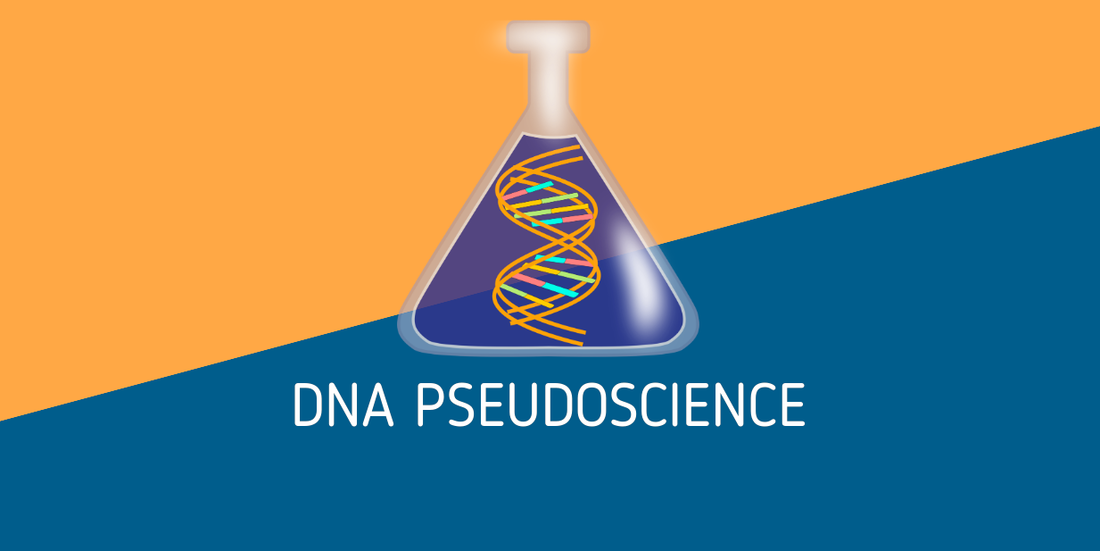DNA Pseudoscience

There's a lot of pseudoscience floating around about DNA and genetics these days. Many times a health problem will be explained as "genetic" by someone who hasn't the slightest idea what they're talking about. People in the mental health profession, I've noticed, are quick to explain that somebody's mental disorder is "genetic" without having an understanding of what evidence would demonstrate that.
"It's genetic" seems to be the go to response for a lot of people about a lot of things.
Consumer genetic tests have become popular and many people use them in hopes of finding out secrets of their ancestry, or to gain an insight into what health concerns may trouble them in the future.
But genes, I understand, haven't lived up to the hype that we've been sold on, that they will unlock all kinds of secrets about us and offer explainations for everything we want to know about ourselves.
Take a look at these search results for "dna pseudoscience":
- The Next Pseudoscience Health Craze Is All About Genetics - Gizmodo https://gizmodo.com/the-next-pseudoscience-health-craze-is-all-about-geneti-1792194708
- Scientists Push Back Against Booming Genetic Pseudoscience Market https://gizmodo.com/scientists-push-back-against-booming-genetic-pseudoscie-1796923059
- Maybe DNA Can't Answer All Our Questions About Heredity | WIRED https://www.wired.com/story/maybe-dna-cant-answer-all-our-questions-about-heredity/
- Genetic ancestry testing is an inexact science, task force says https://blogs.scientificamerican.com/observations/genetic-ancestry-testing-is-an-inexact-science-task-force-says/
- Beware the pseudo gene genies | Science | The Guardian https://www.theguardian.com/science/2015/jul/19/epigenetics-dna--darwin-adam-rutherford
- 'It made me question my ancestry': does DNA home testing really ... https://www.theguardian.com/lifeandstyle/2018/aug/11/question-ancestry-does-dna-testing-really-understand-race
- Why You Should Think Twice About Those DNA-By-Mail Results : 13.7 ... https://www.npr.org/sections/13.7/2017/07/06/535767665/why-you-should-think-twice-about-those-dna-by-mail-results
- DNA kits by mail order – accuracy of determining your ancestry? https://www.skepticalraptor.com/skepticalraptorblog.php/dna-kits-mail-order-ancestry-accuracy/
- Epigenetics: Avoiding the Pull of Pseudoscientific Nonsense | What is ... https://www.whatisepigenetics.com/epigenetics-avoiding-the-pull-of-pseudoscientific-nonsense/
- Viewpoint: Many consumer DNA tests rely on pseudoscience, 'useless ... https://geneticliteracyproject.org/2017/09/08/viewpoint-many-consumer-dna-tests-rely-pseudoscience-useless-data/
I've been reading Rupert Sheldrake's book lately. He mentions how genetics hasn't lived up to the promise we believed it would offer. Genetics is good I guess, but it doesn't seem it's not as consumer accessable, conclusive, and as easily understandable as all of the genetics products companies make it out to be.
I guess what got me thinking along the lines of what I wrote on this page was that I logged into the LoseIt weightloss app on my phone and I saw that the app had a premium feature available called embodyDNA. The tagline for this feature is "Learn how your DNA can help you reach a healthy weight."
Now I don't know what this product offers, but with any consumer targeted DNA testing product, I think there's reason to be skeptical. I don't know what exactly they're offering or if it's pseudoscientific. Seeing the product just prompted my thinking of all of the DNA testing products out there and how many are considered to be pseodoscientific.

